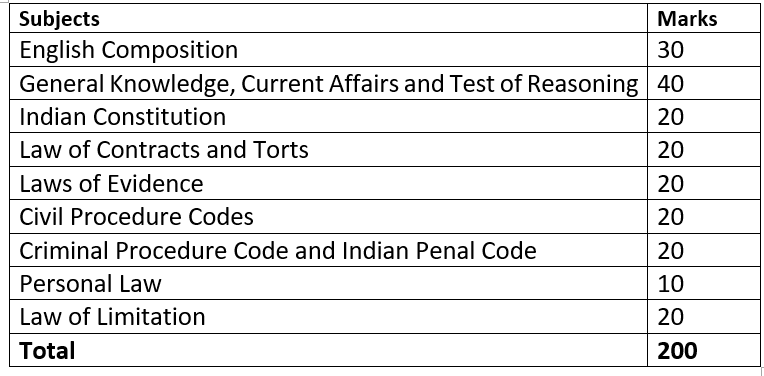Eligibility Criteria
- A citizen of India or such a person of other nationality as declared eligible by Government of India
- A degree in Law from any University or Institution affiliated to any University recognized by the State Goverment or the Central Govemment
- Enrolment as an advocate in the roll of Bar Council of any State or Union Territory in India on the date of advertisement for the examination
- Ability to read. write and speak in Bengali (not required for those candidates whose mother tongue is Nepali)
Age Limit
Not less than 23 years and not more than 35 years on the date of advertisement for the examination Upper age limit Relaxation:
- By 5 years for SC and ST candidates of West Bengal
- By 3 years for BC (Non-Creamy Layer) candidates of West Bengal
- Upto 45 years of age for Persons with Disabilities having physical disability of 40% and above
- By 2 years for candidates who have been in Government service for at least two years
Stages Of Examination
Prelims
Mains
Personality Test
The Preliminary Examination will consist of one paper of Objective Type containing 200 Multiple Choice Questions. The paper will carry 200 marks and will be of 2.5 hours’ duration.
Questions on English Composition antonyms, idioms and phrases, vocabulary test, phrasal verbs, the same words bearing more than one meaning, use of appropriate and qualifying words etc. The Standard of the paper will be of the level of knowledge as expected of a graduate in Law of a recognized University. The paper will include questions covering the following fields of knowledge

The Mains/Final examination will consist of eight compulsory papers and three papers on optional subjects to be chosen by the candidates from the list of Optional Subjects. Each compulsory and Optional paper will carry 100 marks and will be of three hours duration.
Compulsory Papers
- ● English Composition, essay precis writing
- ● Bengali/Hindi/Urdu/Nepali/Santali composition, essay and translation from English into Bengali/Hindi/Urdu /Nepali/Santali
- ● General Knowledge and Current Affairs
- ● Civil procedure Code
- ● Criminal Procedure Code and Indian Penal Code
- ● Indian Evidence Act
- ● Law of Contracts and Torts and
- ● Transfer of Property Act
Optional Papers (any three to be chosen) :
- ● Hindu Law
- ● Muhammadan Law
- ● Jurisprudence and principles of legislation
- ● Indian Law relating to Companies and Insurance
- ● Principles of Equity including the Law of Trusts and Specific Relief
- ● Partnership Act
- ● Law of Limitation and Law of Prescription
- ● The Indian Constitution and Constitutional Law
The standard of examination in the Law papers (Compulsory and Optional) will be that of the LL.B. Degree of the Calcutta University. All answers must be written either in English or in Bengali (unless otherwise directed in the question papers) except in the language papers.
The Preliminary Examination is meant to serve as a screening test only for the purpose of selection of candidates for the Final Examination. The marks obtained by the candidates in the Preliminary Examination will not be counted for the purpose of determining the final merit list. The Final merit list will be prepared on the basis of total marks obtained in the Final Examination and the Personality Test. There shall be no separate qualifying marks for any individual paper or for the Personality Test. The Commission shall have discretion to fix qualifying marks in the aggregate.
In all the answer papers of the Final Examination due credit will be given for proper economy of words combined with clarity and effectiveness of expression and originality of approach.
PENALTY : Debarment for 3 (three) years from appearing in all examinations conducted by the P.S.C., W.B. in addition to cancellation of candidature of the examination in case of disclosure of identity by the candidate..



